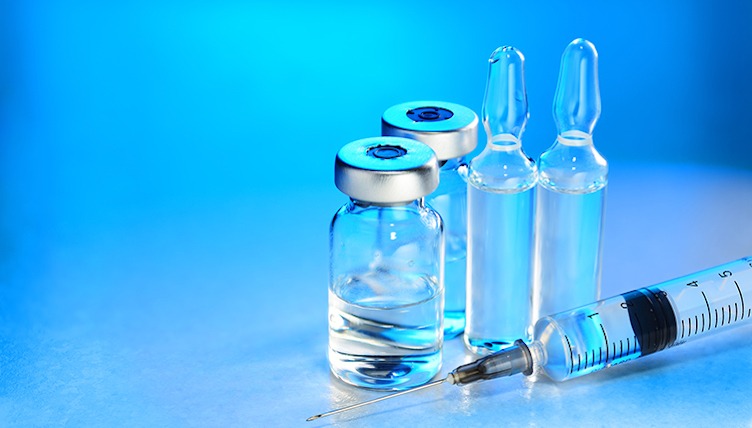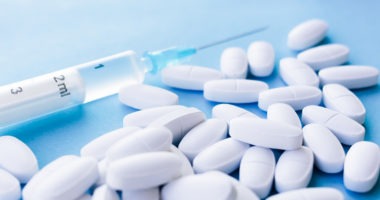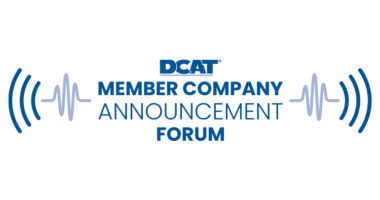The Race for a Vaccine Against the Novel Coronavirus
Johnson & Johnson reported this week that it expects its lead vaccine candidate against the novel coronavirus (COVID-19) to enter clinical trials in September and outlined a manufacturing plan. Sanofi, GSK, Pfizer, Moderna, and CureVac are among other companies advancing COVID-19 vaccine research. What is the progress thus far?
J&J provides update on COVID-19 lead vaccine candidate
Johnson & Johnson (J&J) reported this week (March 30, 2020) on the selection of a lead COVID-19 vaccine candidate from constructs it has been working on since January 2020; the significant expansion of the existing partnership between the Janssen Pharmaceutical Companies of Johnson & Johnson and the Biomedical Advanced Research and Development Authority (BARDA) at the US Department of Health and Human Services (HHS); and the scaling of the company’s manufacturing capacity with the goal of providing global supply of more than one billion doses of a vaccine. The company expects to initiate human clinical studies of its lead vaccine candidate at the latest by September 2020 and anticipates the first batches of a COVID-19 vaccine could be available for emergency use authorization in early 2021, an accelerated timeframe in comparison to the typical vaccine-development process.
Through a partnership, BARDA, which is part of the Office of the Assistant Secretary for Preparedness and Response (ASPR) at the HHS, and J&J have committed more than $1 billion of investment to co-fund vaccine research, development, and clinical testing. J&J will use its validated vaccine platform and is allocating resources, including personnel and infrastructure globally, as needed, to focus on these efforts. Separately, BARDA and the company have provided additional funding that will enable expansion of their ongoing work to identify potential antiviral treatments against the novel coronavirus.
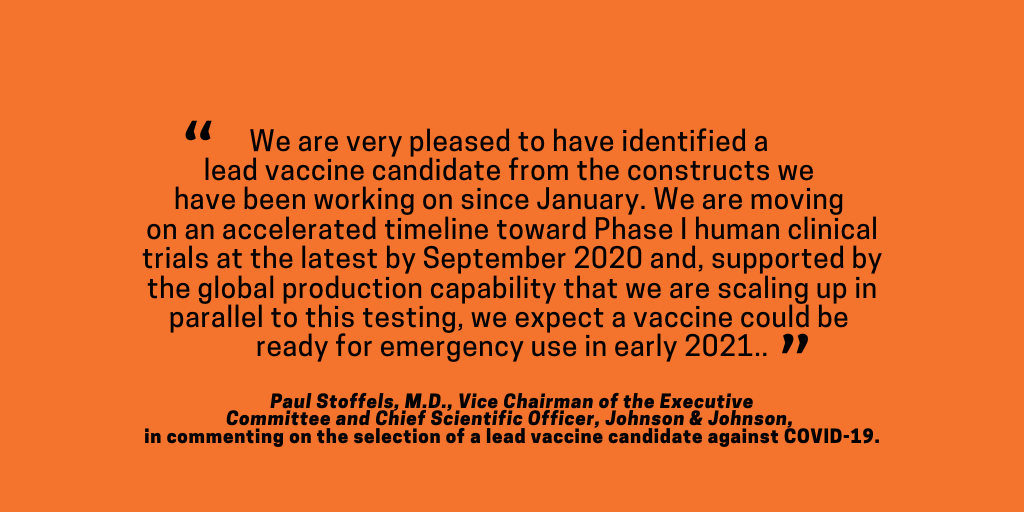
J&J is also expanding the company’s global manufacturing capacity, including through the establishment of new US vaccine-manufacturing capabilities and scaling up capacity in other countries. The company says that the additional capacity will assist in the rapid production of a vaccine and will enable the supply of more than one billion doses of a vaccine globally. The company says it is committed to bringing an affordable vaccine to the public on a not-for-profit basis for emergency pandemic use.
J&J began efforts in developing a COVID-19 vaccine in January 2020 as soon as the novel coronavirus sequence became available, to research potential vaccine candidates. Research teams at Janssen, in collaboration with Beth Israel Deaconess Medical Center, part of the Harvard Medical School, constructed and tested multiple vaccine candidates using the Janssen AdVac technology, which is based on the development and production of adenovirus vectors (gene carriers). Through collaborations with scientists at multiple academic institutions, the vaccine constructs were then tested to identify those with the most promise in producing an immune response in preclinical testing.
Based on this work, J&J has identified a lead COVID-19 vaccine candidate (with two back-ups), which will progress into the first manufacturing steps. Under an accelerated timeline, the company is aiming to initiate a Phase I clinical study in September 2020, with clinical data on safety and efficacy expected to be available by the end of the year. This could allow vaccine availability for emergency use in early 2021. For comparison, the typical vaccine development process involves a number of different research stages, spanning five to seven years, before a candidate is even considered for approval, according to information from J&J.
The COVID-19 vaccine program is using Janssen’s AdVac and PER.C6 technologies that provide the ability to rapidly develop new vaccine candidates and upscale production of the optimal vaccine candidate. The same technology was used to develop and manufacture the company’s Ebola vaccine and construct its Zika, respiratory syncytial virus, and HIV vaccine candidates, which are in Phase II or Phase III clinical development stages.
Sanofi, Pfizer, GSK advance COVID-19 research
Other large pharmaceutical companies are also advancing research into a vaccine against COVID-19 as outlined below.
Sanofi. Sanofi Pasteur, the vaccines business unit of Sanofi, and Translate Bio, a clinical-stage messenger RNA (mRNA) therapeutics company, announced on March 27, 2020 that they will collaborate to develop a novel mRNA vaccine for COVID-19. This collaboration is based an existing agreement from 2018 between the two companies to develop mRNA vaccines for infectious diseases.
Translate Bio has begun to produce multiple mRNA constructs and will use its mRNA platform to discover, design, and manufacture a number of vaccine candidates against SARS-CoV-2, the virus that causes COVID-19. Under the collaboration, Sanofi will provide vaccine expertise and support from its external research networks to advance vaccine candidates for potential further development. Translate Bio has established 100-gram single-batch production with its clinical-stage mRNA therapeutics platform. Build-out is underway of dedicated manufacturing space through a contract manufacturing partner to accommodate at least two 250-gram batches per month.
mRNA vaccines offer a new approach by delivering a nucleotide sequence encoding the antigen or antigens selected for their high potential to induce a protective immune response, according to information from Sanofi. mRNA vaccines also represent a potential alternative to conventional vaccine approaches for several reasons: their high potency, ability to initiate protein production without the need for nuclear entry, capacity for rapid development, and potential for low-cost manufacture and safe administration using non-viral delivery, according to information from the company. This approach potentially enables the development of vaccines for disease areas where vaccination is not a viable option. Additionally, a desired antigen or multiple antigens can be expressed from mRNA without the need to adjust the production process to enable flexibility and efficiency in development, explained the company.
For Sanofi, this marks a second collaboration in its efforts to develop a novel COVID-19 vaccine candidate. In February 2020, Sanofi announced a collaboration with the HHS’ BARDA to advance a novel COVID-19 vaccine candidate. The agreement with BARDA calls for Sanofi to initiate development of a recombinant, protein-based vaccine candidate against COVID-19.
Pfizer. In March (March 2020), Pfizer and BioNTech, a Mainz, Germany-based immunotherapy company, agreed to a letter of intent regarding the co-development and distribution (excluding China) of a potential mRNA-based coronavirus vaccine aimed at preventing COVID-19 infection. The companies have executed a material transfer and collaboration agreement to enable the parties to start working together. The collaboration aims to accelerate development of BioNTech’s potential first-in-class COVID-19 mRNA vaccine program, BNT162, which is expected to enter clinical testing by the end of April 2020, subject to regulatory approval, according to information reported by the companies as of March 17, 2020. The collaboration builds on the research and development collaboration into which Pfizer and BioNTech entered in 2018 to develop mRNA-based vaccines for prevention of influenza.
BioNTech also formed a strategic alliance with Fosun Pharma, a Shanghai-based pharmaceutical company, to jointly develop its COVID-19 vaccine in China. The two companies will work together on the development of a vaccine candidate in China by conducting clinical trials in China and using Fosun Pharma’s clinical development, regulatory, and commercial capabilities in the country. If approved, Fosun Pharma will commercialize the vaccine in China. Fosun Pharma also agreed to take a $50-million equity stake in BioNTech.
In addition. BioNTech says it plans to manufacture the vaccine for clinical trials along with its partner, Polymun, a Klosterneuburg, Austria-based CDMO, at BioNTech’s mRNA manufacturing facilities in Europe, and is preparing to ramp up production for global supply in collaboration with its partners.
GlaxoSmithKline. GlaxoSmithKline (GSK) is partnering to provide its adjuvant systems in COVID-19 vaccine research. An adjuvant is added to some vaccines to enhance the immune response, thereby creating a stronger and longer lasting immunity against infections than the vaccine alone. The use of an adjuvant is of particular importance in a pandemic situation since it may reduce the amount of vaccine protein required per dose, thereby allowing more vaccine doses to be produced.
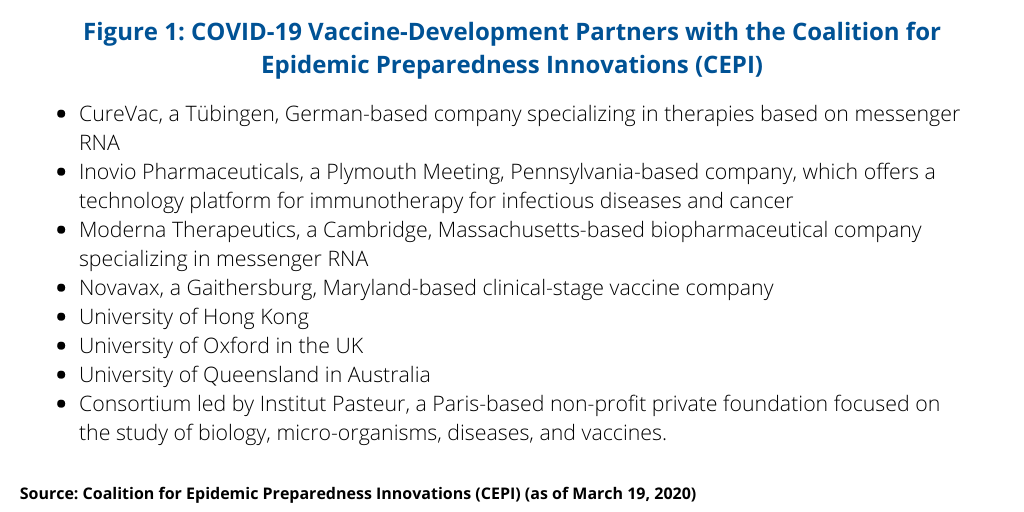
In early February 2020, GSK and the Coalition for Epidemic Preparedness Innovations (CEPI), a public–private coalition that seeks to derail epidemics by speeding up the development of vaccines, agreed to collaborate on developing a vaccine for the novel coronavirus with GSK making its pandemic vaccine adjuvant platform technology available for the development of a COVID-19 vaccine.
To date (as of March 27, 2020) CEPI has initiated eight COVID-19 vaccine development projects with the following: CureVac, a Tübingen, German-based company specializing in therapies based on messenger RNA; Inovio Pharmaceuticals, a Plymouth Meeting, Pennsylvania-based company, which offers a technology platform for immunotherapy for infectious diseases and cancer; Moderna Therapeutics, a Cambridge, Massachusetts-based biopharmaceutical company specializing in messenger RNA; Novavax, a Gaithersburg, Maryland-based clinical-stage vaccine company; the University of Hong Kong; the University of Oxford in the UK; the University of Queensland in Australia; and a consortium led by Institut Pasteur, a Paris-based non-profit private foundation focused on the study of biology, micro-organisms, diseases, and vaccines. Further updates of the partnerships with Moderna, CureVac, Novavax, and Inovio are provided later in this article.
In late March (March 27, 2020), the UK government awarded £210 million ($270 million) to boost funding for CEPI. The UK’s announcement builds on the £50 million ($62 million) already given by the UK government to CEPI to support its vaccine development work against COVID-19 and other emerging infectious diseases. Further financial support for CEPI’s COVID-19 efforts has been provided by the governments of Germany, Norway, Denmark, and Finland. CEPI has so far received over $430 million toward a funding goal of $2 billion, which it put forth in late February, to support the development of a vaccine against the virus responsible for COVID-19.
In addition in working with CEPI, GSK has partnered with Clover Biopharmaceuticals, a Chengdu, China-based clinical-stage biopharmaceutical company, in a research collaboration for Clover’s protein-based coronavirus vaccine candidate (COVID-19 S-Trimer). Under the agreement announced in late February 2020, GSK will provide Clover with its pandemic adjuvant system for further evaluation of Clover’s S-Trimer as a vaccine candidate in preclinical studies. Using Clover’s proprietary Trimer-Tag technology, Clover produced an S-Trimer subunit vaccine that resembles the native trimeric viral spike via a rapid mammalian cell-culture based expression system. Clover says its proprietary Trimer-Tag technology has been recognized by antibodies produced by multiple previously infected coronavirus patients. Clover’s Trimer-Tag technology is a drug-development platform that allows the production of covalently trimerized fusion proteins. Many major disease targets are trimerization-dependent such as the tumor necrosis factor superfamily (involved in extrinsic apoptosis, immune co-stimulation and inflammation) as well as enveloped RNA virus antigens responsible for entry into host cells. Clover is using Trimer-Tag technology to create trimerized fusion proteins that are able to target these previously undruggable pathways. In late March (March 2020), Clover also formed a research collaboration to develop a vaccine candidate to prevent COVID-19 with Dynavax, an Emeryville, California-based biopharmaceutical company. Dynavax is providing technical expertise and the company’s proprietary toll-like receptor 9 agonist adjuvant, CpG 1018, to support this initiative.
Updates from Moderna, CureVac, and others
Other companies are advancing research for a vaccine against COVID-19 as outlined below.
Moderna Therapeutics. In mid-March (March 16, 2020), Moderna Therapeutics announced that the first participant has been dosed in the Phase I study of the company’s mRNA vaccine (mRNA-1273) against the novel coronavirus. This Phase I study is being conducted by the US National Institutes of Health (NIH) under its own investigational new drug (IND) application.
mRNA-1273 is an mRNA vaccine against SARS-CoV-2 encoding for a prefusion stabilized form of the Spike (S) protein, which was selected by Moderna in collaboration with investigators from the Vaccine Research Center at the National Institute of Allergy and Infectious Diseases (NIAID), a part of the NIH. Manufacture of the first clinical batch was funded by CEPI.
The Phase I study is evaluating the safety and immunogenicity of three dose levels of mRNA-1273 (25, 100, 250 μg) administered on a two-dose vaccination schedule, given 28 days apart. A total of 45 healthy adults will be enrolled in the study. Participants will be followed through 12 months after the second vaccination. The primary objective is to evaluate the safety and reactogenicity of a two-dose vaccination schedule of mRNA-1273. The secondary objective is to evaluate the immunogenicity to the SARS-CoV-2 S protein.
The company says it is actively preparing for a potential Phase II study under its own IND to build on data from the ongoing Phase I study being conducted by the NIH. Moderna says it intends to work with the US Food and Drug Administration and other government and non-government organizations to be ready for a Phase II trial and any subsequent trials, which are anticipated to include a larger number of subjects and which will seek to generate additional safety and immunogenicity data. Manufacture of the mRNA-1273 material for the potential Phase II trial, which the company says as of March 17, 2020 could begin in a few months, is underway, and that it is preparing for rapid acceleration of its manufacturing capabilities that could allow for the future manufacture of millions of doses should mRNA-1273 prove to be safe and effective.
CureVac. CureVac, a clinical-stage biopharmaceutical company of mRNA-based drugs for vaccines and therapeutics, reported in mid-March (March 2020) that it is internally focused on the development of a coronavirus vaccine and has been in contact with CEPI, the private–public organization focused on COVID-19 development. CureVac also reported in mid-March that it is working on expanding its manufacturing capacities to be able to provide up to billions of doses for outbreak situations such as COVID-19.
Novavax. In March (March 2020), Novavax was awarded initial funding of $4 million CEPI to support Novavax’ efforts to develop a COVID-19 vaccine. CEPI and Novavax are having ongoing discussions on additional funding from CEPI to address Novavax’s costs through Phase I development. Novavax has produced and is currently assessing multiple recombinant nanoparticle vaccine candidates in animal models prior to advancing to clinical trials. As of March 10, 2020, the company says that initiation of Phase I clinical testing is expected in late spring of 2020. Novavax’ COVID-19 vaccine candidates were created with its proprietary recombinant protein nanoparticle technology platform to generate antigens derived from the coronavirus spike (S) protein. Novavax also expects to use its proprietary Matrix-M adjuvant with its COVID-19 vaccine candidates to enhance immune responses.
Novavax recently entered into an agreement with Emergent BioSolutions, a Gaithersburg, Maryland-based CDMO, to provide contract development and manufacturing service to supply Novavax with vaccine product for preclinical testing and for use in its Phase I clinical trial. Emergent will use its two Baltimore, Maryland facilities to manufacture drug substance at its Bayview facility, designated by the HHS as a Center for Innovation in Advanced Development and Manufacturing, and drug product at its Camden facility.
Inovio Pharmaceuticals. Inovio Pharmaceuticals is developing a DNA vaccine (INO-4800) against the novel coronavirus. The company received a grant of up to $9 million from CEPI to fund ongoing preclinical and initial clinical development of INO-4800. After ongoing preclinical studies, the company reported in March (March 2020) that human clinical trial designs were finalized with 3,000 human trial doses prepared for clinical trials in the US, China, and South Korea and that large-scale manufacturing plans were developed. The company said (as of March 3, 2020) that it expects to begin human clinical trials in 30 healthy volunteers in the US with human clinical trials to begin in China and South Korea shortly thereafter.

